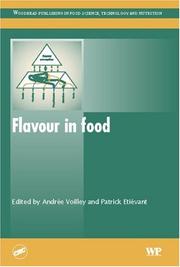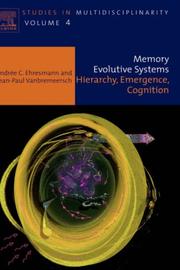| Listing 1 - 10 of 11 | << page >> |
Sort by
|
Digital
ISBN: 9780128125618 0128125616 Year: 2019 Publisher: Amsterdam Academic Press
Abstract | Keywords | Export | Availability | Bookmark
 Loading...
Loading...Choose an application
- Reference Manager
- EndNote
- RefWorks (Direct export to RefWorks)
Gases in Agro-food Processes is the ultimate reference covering all applications of gases in agro-Food processes, from farm to fork. Divided into 11 sections, the book covers chemical and physical gas properties, gas monitoring, regulation, heat and mass transfers. Sections are dedicated to agriculture and food processing, wastewater treatment, safety applications and market trends. Users will find this to be a valuable resource for industrial scientists and researchers in technical centers who are developing agro-food products. In addition, the book is ideal for graduate students in agro-food science, chemistry and the biosciences. --

ISBN: 1601191324 9781601191328 1855739607 9781855739604 1845691407 9781845691400 9786610544608 6610544603 0849334373 9780849334375 Year: 2006 Publisher: Cambridge, England Woodhead Pub
Abstract | Keywords | Export | Availability | Bookmark
 Loading...
Loading...Choose an application
- Reference Manager
- EndNote
- RefWorks (Direct export to RefWorks)
The first part of the book reviews the way flavour is detected and measured. The first two chapters discuss our understanding of how humans perceive and then process information about taste compounds. Chapter three reviews current practice in the sensory analysis of food flavour. Chapter four discusses choosing from the wide range of instrumental techniques which have been developed to identify aroma compounds. The final chapter in Part One discusses the complex issues in matching instrumental measurements with the results of sensory evaluation of foods. Part two reviews key research in the way flavour compounds are retained within foods and the factors determining the way they are released. There are chapters on flavour compound interactions with lipids, emulsions, protein and carbohydrate components in food. Other chapters review modelling aroma interactions in food matrices and mechanisms of flavour retention in and release from liquid food products. The final part reviews what we now know about how humans experience flavour release, together with some of the key factors influencing this process. There are chapters on the process of flavour release in the mouth, the way texture-aroma and odour-taste interactions influence this process, psychological factors and the development of flavour perception during infancy. Flavour in food seeks to distil key developments in flavour science and summarise their implications for the food industry. It is a valuable reference for R & D staff, those responsible for sensory evaluation of foods and product development, as well as academics and students involved in flavour science. Understand how flavour is detected and measuredAnalyses key research in the retention and release of flavour compoundsExamines how humans experience flavour release.

ISBN: 9780444522443 0444522441 9780080555416 0080555411 1281186805 9781281186805 Year: 2007 Publisher: [Place of publication not identified] Elsevier Science
Abstract | Keywords | Export | Availability | Bookmark
 Loading...
Loading...Choose an application
- Reference Manager
- EndNote
- RefWorks (Direct export to RefWorks)
The theory of Memory Evolutive Systems represents a mathematical model for natural open self-organizing systems, such as biological, sociological or neural systems. In these systems, the dynamics are modulated by the cooperative and/or competitive interactions between the global system and a net of internal Centers of Regulation (CR) wich a differential access to a central heirarchical Memory. The MES proposes a mathematical model for autonomous evolutionary systems and is based on the Category Theory of mathematics. It provides a framework to study and possibly simulate the structre of "living systems" and their dynamic behavior. MES explores what characterizes a complex evolutionary system, what distinguishes it from inanimate physical systems, its functioning and evolution in time, from its birth to its death. The behavior of this type of system depends heavily on its former experiences, and a model representing the system over a period of time, could anticipate later behavior and perhaps even predict some evolutionary alternatives. The role of the MES model will be two-fold: theoretical, for a comprehension of a fundamental nature and practical, for applications in biology, medicine, sociology, ecology, economy, meteorology, and other sciences. Key Features: *Comprehensive and comprehensible coverage of Memory Evolutive System *Written by the developers of the Memory Evolutive Systems *Designed to explore the common language between sciences.
Digital
Year: 1685 Publisher: Lipsiae apud Mauritium Georgium Weidmannum
Abstract | Keywords | Export | Availability | Bookmark
 Loading...
Loading...Choose an application
- Reference Manager
- EndNote
- RefWorks (Direct export to RefWorks)
Digital
ISBN: 9789462092372 Year: 2013 Publisher: Rotterdam SensePublishers
Abstract | Keywords | Export | Availability | Bookmark
 Loading...
Loading...Choose an application
- Reference Manager
- EndNote
- RefWorks (Direct export to RefWorks)
Private tutoring—supplementary, out-of-school instruction offered at a fee to individuals or groups—represents a substantial household expenditure, even in systems that claim to have free public education. It plays out across, alongside, and even within some school systems. Emerging as a ‘shadow education’, private tutoring now operates as a system and industry crossing national, regional, and social-class boundaries. Private tutoring is provided through different modes of delivery including the internet. Policy makers, parents, teachers, trade unions, corporations, community associations, and students are implicated in the private tutoring industry. The debates over private tutoring are therefore part of the larger struggles over the ends of education in just and equitable societies. The authors in this volume address diverse national settings of private tutoring across the Mediterranean, and examine its political, economic, social, and cultural underpinnings. They draw on a range of conceptual frameworks, and deploy a variety of research methods to problematize the multifaceted relationships between tutoring, learning, and equity. The volume captures a multiplicity of voices, and focuses on some of the central challenges facing education in pluralistic societies.
Digital
ISBN: 9780081003008 0081003005 Year: 2016 Publisher: Duxford, UK Woodhead Publishing is an imprint of Elsevier
Abstract | Keywords | Export | Availability | Bookmark
 Loading...
Loading...Choose an application
- Reference Manager
- EndNote
- RefWorks (Direct export to RefWorks)
Flavor: From Food to Behaviors, Wellbeing and Health is the first single-volume resource focused on the different mechanisms of flavor perception from food ingestion, to sensory image integration and the physiological effects that may explain food behaviors. The information contained is highly multidisciplinary, starting with chemistry and biochemistry, and then continuing with psychology, neurobiology, and sociology. The book gives coherence between results obtained in these fields to better explain how flavor compounds may modulate food intake and behavior. When available, physiological mechanisms and mathematical models are explained. Since almost half a billion people suffer from obesity and food related chronic diseases in the world, and since recent research has investigated the possible roles of pleasure linked to the palatability of food and eating pleasure on food intake, food habits, and energy regulation, this book is a timely resource on the topic. This book links these results in a logical story, starting in the food and the food bolus, and explaining how flavor compounds can reach different receptors, contribute to the emergence of a sensory image, and modulate other systems recognized as controlling food intake and food behavior. The influence of age, physiological disorders, or social environments are included in this approach since these parameters are known to influence the impact of food flavor on human behavior.
Multi
ISBN: 9783030509217 Year: 2020 Publisher: Cham Springer International Publishing
Abstract | Keywords | Export | Availability | Bookmark
 Loading...
Loading...Choose an application
- Reference Manager
- EndNote
- RefWorks (Direct export to RefWorks)
This book poses questions on how to work ethically in research on science education. Applying research ethics reflectively and responsibly is fundamental for conducting research with people. It seeks to renew the conversation on how and why to engage with ethics in science education research and to adjust and refine research practices. It highlights both the need for methodological reflections in science education research and the particular ethical research challenges of science education. Science education research involves the study of people – often young and vulnerable people – and their practices. Researchers working within humanities and social science research commonly follow guidelines and codes of conducts set by country-specific ethics committees. Such guidelines function as minimal requirement for ethical reflection. This book seeks to engage the community of science education researchers in a conversation on ethics in science education moving beyond the mere compliance with governmental regulations toward a collective reflection. It asks the question of whether the existing guidelines provided for researchers are keeping up with contemporary realities of the visual presence of individuals in digital spaces. It also asks questions on how participatory research methodologies alters the relations between researchers and practitioners. This book is organized into two parts: Part one is entitled Challenging existing norms and practices. It asks questions such as: What are the conditions of knowledge that shape ethical decision making? Where is this kind of knowledge coming from? How is this knowledge structured, and where are the limitations? How can we justify our beliefs concerning our ethical research actions? Part two Epistemological considerations for ethical science education research centres norms and practices of conducting science education research in regard to methods, validity and scope. .
General ethics --- Study methods --- Didactics of sciences --- HO (hoger onderwijs) --- ethiek --- wetenschappen --- studievaardigheden
Digital
ISBN: 9783030915322 9783030915315 9783030915339 9783030915346 Year: 2022 Publisher: Cham Springer International Publishing, Imprint: Palgrave Macmillan
Abstract | Keywords | Export | Availability | Bookmark
 Loading...
Loading...Choose an application
- Reference Manager
- EndNote
- RefWorks (Direct export to RefWorks)
The book analyzes the recovery process of different industries and sectors from the global health pandemic, as well as its collateral effects. Focusing on emerging markets, it examines the underlying factors that have impeded recovery and how businesses in various sectors have (or have not) responded. The chapters take both a micro and macro approach, surveying the topic from both organizational and national perspectives. Divided into sections on public policy, innovation, and social responsibility, this work explores the parameters of business and economic perspectives for the construction of effective models to pursue an effective recovery. It will appeal to scholars studying how business responds in the new normal. Andrée Marie López-Fernández is a Professor and Researcher at the School of Economics and Business Administration at the Universidad Panamericana, Mexico. Her research areas of interest include corporate social responsibility, social media and viral marketing, governance and consumer behavior. Dr. Andrée Marie is an Associate Editor for Emerald Emerging Markets Case Studies Journal, and has been conferred as a member of the Mexican National System of Researchers by CONACYT. Antonia Terán-Bustamante is a Researcher and Professor at the School of Economics and Business Administration at the Universidad Panamericana, Mexico, and is a member of the Mexican National System of Researchers by CONACYT. Her research is focused on Human Capital, Competitiveness, Innovation, and Entrepreneurship.
Digital

Year: 1867 Publisher: Paris J. Rotschild, éditeur
Abstract | Keywords | Export | Availability | Bookmark
 Loading...
Loading...Choose an application
- Reference Manager
- EndNote
- RefWorks (Direct export to RefWorks)
Digital
Year: 1847 Publisher: Paris J. Renouard
Abstract | Keywords | Export | Availability | Bookmark
 Loading...
Loading...Choose an application
- Reference Manager
- EndNote
- RefWorks (Direct export to RefWorks)
Protectionism --- France -- Commercial policy --- Great Britain -- Commercial policy
| Listing 1 - 10 of 11 | << page >> |
Sort by
|

 Search
Search Feedback
Feedback About UniCat
About UniCat  Help
Help News
News